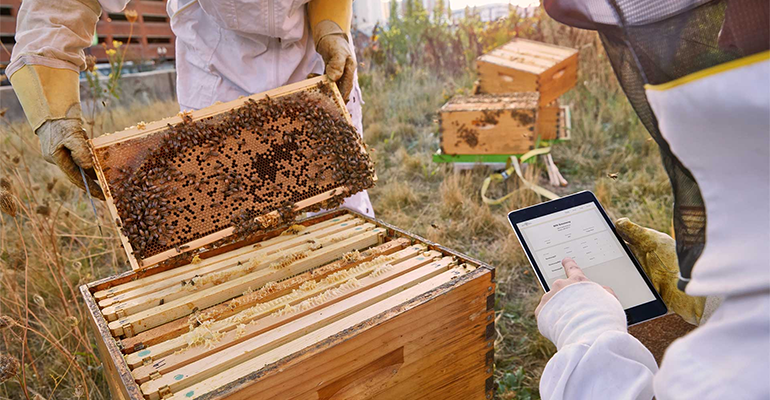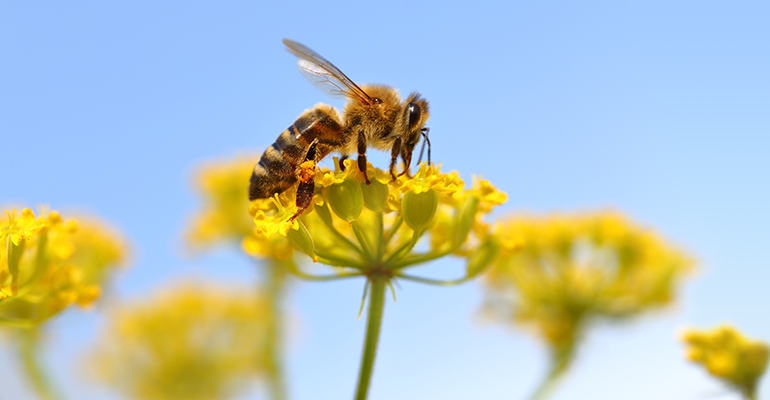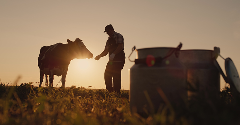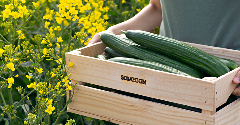News
How the food industry can take action to protect bees
29 Sep 2022
From practicing polyculture to using organic biocontrol measures, the food industry must act to safeguard the population, health, and resilience of bees, says the Best Bees Company.
Bees have a long-standing relationship with food; they are essential for pollinating many major food crops.

“Before there even was a food industry at all, bees were crucial to ensuring crops flourished,” says Emily O’Neil, staff scientist at The Best Bees Company, a US company that installs and maintains honeybee hives on commercial and residential properties in urban across the US. These hives serve as data points in its national network of data-yielding beehives.
“No other animal has such a positive impact on the environment, the economy, and our food supply,” O’Neil says. “Without bees to pollinate them, we would lose more than 75% of our food crops.”
Bees as pollinators
A recent study analysed bees’ current role in crop production and food prices. Researchers at the University of Reading conducted more than 200 experiments comparing the yields of crop plants with or without insect pollination.
The study’s results revealed 32% less variability in the plant yields that had been visited by pollinators, such as bees. These findings suggest that bees can improve crop yields. By supporting and promoting pollinators, the industry may be able to help to stabilise food supply and prevent future food price hikes.
However, modern agriculture practices, such as monocultures and pesticides, indicate prioritisation of crop yield and efficiency overachieving a symbiotic relationship with natural processes, including insect pollination, O’Neil says. “The agriculture industry has effectively bitten the hand that feeds it—the bees,” says O’Neil.
The recent study signals a growing awareness of the necessity to find alternatives to the pesticides used on the globe’s ecosystem. “This is heartening, but it is concerning to see advancements in bee research leveraging bees in non-traditional ways without thorough study into the safety of the bees themselves,” O’Neil adds.

© AdobeStock/viperagp
Safeguarding bees for tomorrow’s food manufacturing
Food manufacturers and the wider industry can take several steps to protect pollinators. Namely, brands can practice polyculture to restore biodiversity to farmlands and support strong, resilient bees. Polyculture is the simultaneous production of more than one plant species on the same land area to encourage crop yields, conserve soil, and lower pest damage.
Additionally, O’Neil recommends that the food sector uses only organic approaches to biocontrol. Alternatively, if pesticides and insecticides must be used, choose the most bee-friendly methods possible. Delaying applications until honeybees and other pollinators cease foraging for the day can reduce the risk of exposure, O’Neil adds.
“If you must use pesticides, take steps to reduce or avoid pesticide drift, especially in areas with flowering vegetation and actively foraging pollinators,” says O’Neil. Checking the weather forecast to avoid making applications during conditions such as high winds and temperature inversions that make pesticide drift more likely is advised.
Farmers can also enrol in the US Conservation Reserve Program (CRP), which, O’Neil says, can help pay for the transfer of unproductive cropland to its native habitat. Another practice under CRP that incorporates habitat within farmland is prairie strips or land seeded with diverse native prairie plants. Prairie strips can reduce some of the negative impacts of agriculture like runoff or erosion while also creating habitat and diverse forage for bees, O’Neil continues.
Food companies can also keep bees themselves. “The greatest opportunity is easily that, should every field need beehives in order to transport this fungicide, there is a strong possibility of bee population growth,” says O’Neil. “However, pollinator advocates and protectors are not only concerned with population numbers but also the health and resiliency of the bees.”
Related news

Soy story: WWF scores UK supermarkets on sustainability efforts
12 Nov 2025
WWF has published its latest “Soy Scorecard”, ranking UK supermarkets’ efforts to combat deforestation and land conversion in their soy supply chains.
Read more
Standing Ovation and Bel scale up casein production from dairy co-products
11 Nov 2025
Foodtech company Standing Ovation has partnered with cheese specialist Bel Group to manufacture dairy serums for industrial-scale casein production via precision fermentation.
Read more
New UPF standard hoped to offer consumers ‘coherence and clarity’
10 Nov 2025
Ingredients companies are being urged to enter “a new era of partnership and innovation” following the launch of the industry’s first non-UPF verification scheme.
Read more
Whistleblowers accuse UK meat industry of promoting cheap, unsustainable supply
7 Nov 2025
An anonymous group of industry insiders has accused the UK’s biggest food companies of systematically driving down meat quality and welfare standards.
Read more
Bord Bia presents Irish dairy ingredient suppliers at Fi Europe
6 Nov 2025
Dairygold Co-operative Society, The Carbery Group, and Ornua Co-operative: Meet with sustainable producers of Irish dairy ingredients at Food ingredients Europe 2025, Hall 7.2 Stand M18.
Read more
AI attraction means foodtech startups must ‘prove’ rather than ‘promise’
4 Nov 2025
Reports suggest that artificial intelligence (AI) is sucking investment from foodtech and agritech, but investors say the picture is complicated.
Read more
Penguin and Club bars no longer classed as chocolate
30 Oct 2025
Penguin and Club bars can no longer be classified as chocolate after the pladis-owned McVitie’s brands turned to cheaper alternatives amid the ongoing cocoa crisis.
Read more
Could plant-based protection replace plastic packaging?
29 Oct 2025
Swedish foodtech company Saveggy has launched an additive-free plant-based protection for cucumbers, offering a waste-free packaging solution for fruit and vegetables.
Read more
Does promoting protein content push up plant-based sales?
27 Oct 2025
Promoting the protein content of meat-free products is a more effective sales strategy than adding carbon labels, a study of UK bakery chain Greggs suggests.
Read more
Amazon Grocery launch aims to balance quality with affordability
22 Oct 2025
Global e-commerce giant Amazon has introduced a new private-label food brand, combining existing Amazon Fresh and Happy Belly products with new everyday items.
Read more